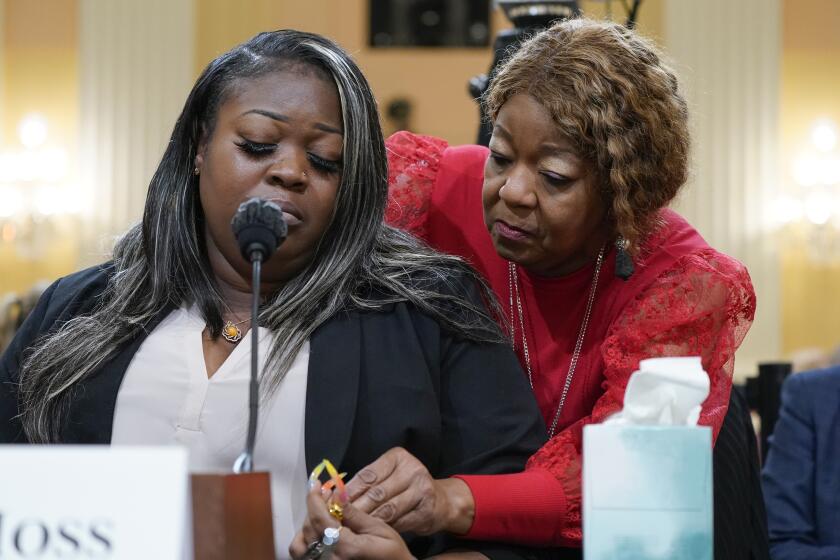British forces turn over province to Iraqis
CAMP SPARROWHAWK, IRAQ — With the flourish of a pen and a businesslike handshake, the British on Wednesday turned over a lawless stretch of desert and marshland to Iraqi provincial control.
Maysan was the fourth of Iraq’s 18 provinces to be handed over and the third by British-led troops. Britain has started drawing down its forces in the four southern provinces even as the U.S. increases its troop strength in Baghdad and elsewhere.
British officers say they are responding to a different set of problems than their American counterparts.
U.S. forces in Baghdad and neighboring provinces need the numbers to quell sectarian violence between Sunni Arab and Shiite Muslim fighters, a senior British officer said this week. The overwhelmingly Shiite south, however, presents a different challenge.
“Ninety percent of the violence down here is all against us,” the officer said, speaking on condition of anonymity.
“You put more people on the ground, you are creating more targets.”
Maj. Gen. Jonathan Shaw, the British commander of the Multi-National Division-South East, expressed confidence during the transfer that Iraqi police officers and soldiers would keep a lid on what has always been a turbulent province.
Anxious residents were not so sure. Followers of radical Shiite cleric Muqtada Sadr and his Al Mahdi militia are rushing to fill the power vacuum, residents said, leading on at least one occasion to intense fighting with local police, whose upper echelons are dominated by the rival Shiite Badr Organization and its allied political party, the Supreme Council for Islamic Revolution in Iraq, or SCIRI.
“Our problem ... is that the militias are ruling,” said Ali Hassan, a civil servant in the provincial capital, Amarah, who asked that his last name not be published for security reasons. “If the British troops withdraw, then the Mahdi army will be in control.”
In a sign of lingering security concerns, the date and venue of Wednesday’s transfer were released only after the event.
The ceremony took place in a wind-swept military base on the southwestern outskirts of Amarah. Guests were flown in on military helicopters; British and Iraqi soldiers were positioned on every rooftop.
Prime Minister Nouri Maliki, U.S. Army Gen. David H. Petraeus and U.S. Ambassador Ryan Crocker canceled their plans to attend at the last minute without explanation.
Shaw and provincial Gov. Adil Maliki signed a memorandum of understanding and shook hands before a crowd of officials in suits and tribal leaders in flowing robes. Tents decorated with garlands of artificial flowers shielded guests from the sun. Soldiers, policemen, border officers and firemen, one of them wearing a shiny, metallic-colored suit, marched by.
British officials said the occasion demonstrated the willingness of the Iraqi government to take responsibility for the difficult region. But they acknowledged that it would change little on the ground.
British Prime Minister Tony Blair announced in February that his government would reduce its troop level by 1,600 to about 5,500 by spring but would retain a presence in southern Iraq until at least 2008.
British forces quit their only permanent base in Maysan in August to focus on securing the porous Iranian border. Mobile units equipped with Range Rovers and light armored vehicles will continue to patrol the frontier after the latest transfer, said Lt. Col. Kevin Stratford-Wright, a British military spokesman.
At the time, British officials described the move out of Camp Abu Naji, which had come under numerous mortar attacks, as a “tactical readjustment.” But Sadr’s militia proclaimed the pullout a victory, declaring in messages broadcast over loudspeakers throughout Amarah: “This is the first Iraqi city that has kicked out the occupier.”
The next day, looters swarmed the place, making off with truckloads of booty, including doors, window frames and corrugated iron roofs.
Iraqi soldiers tried to fend them off by firing in the air, but members of the jubilant crowd returned fire.
Violence flared again in October, when Al Mahdi militiamen overran and destroyed at least three police stations. Some officers fought until their ammunition ran out, but others melted away, witnesses said at the time.
British officers noted that it was Iraqi authorities who restored order by rushing in soldiers and a high-level security team from Baghdad to negotiate a truce with the help of tribal leaders.
“At the end of the day, it was an Iraqi solution,” said British Lt. Col. Richard Nixon-Eckersall, commander of the Queen’s Royal Lancers battle group in Maysan.
The provincial government, which is dominated by Sadr’s followers, has since rebuilt the police stations and arrested four people in the slaying of the provincial head of intelligence, a SCIRI member whose death helped touch off the violence.
Residents said violence in Amarah had decreased since October.
“Security is better simply because there are no more raids, confrontations, and explosions, which usually cause many casualties among innocent citizens,” said Ammar Yasir Hassan, who owns a grocery store.
*
Times staff writer Raheem Salman and a special correspondent in Amarah contributed to this report.
More to Read
Sign up for Essential California
The most important California stories and recommendations in your inbox every morning.
You may occasionally receive promotional content from the Los Angeles Times.










